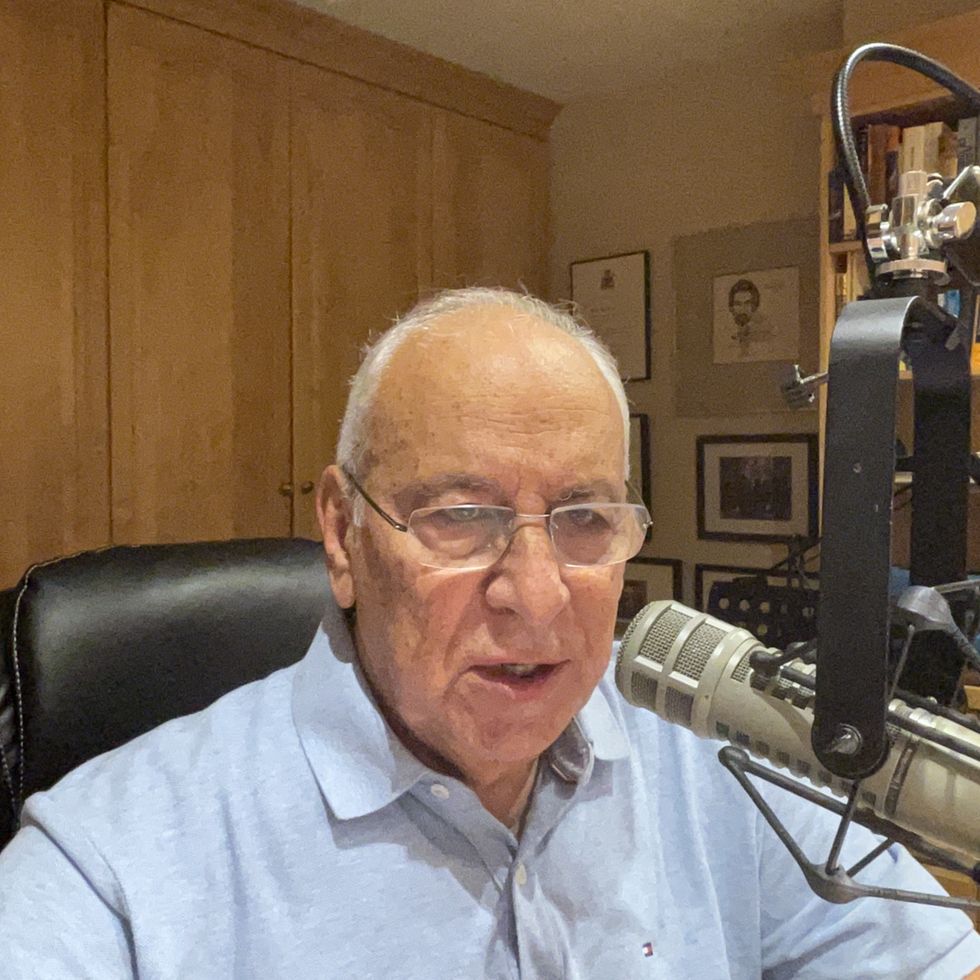Dave Charles' Q&A Spotlights Peter Shurman
Peter Shurman is truly a rare broadcast talent in so many disciplines. He was and still is fearless in taking on any task that comes his way.

By Dave Charles
Peter Shurman is truly a rare broadcast talent in so many disciplines. He was and still is fearless in taking on any task that comes his way. His CV includes technical, management, strategic, marketing, sales, and on top of all that a seven-year career in politics which we all know to be a high-risk/reward ‘blood sport’ job. Peter has worked with some iconic broadcast talents too…Gord Sinclair, George Balcan, Greg Stewart at CJAD Montreal, Wally Crouter, Betty Kennedy, Gordon Sinclair, John Tory, John Stahl, Fred Napoli and Andy Barrie at CFRB Toronto, just to name a few. Peter Shurman is a gifted broadcaster inspiring the next generation.
DC: You began in radio in the sixties as a tech servicing studio and transmitter equipment at CJAD and CJFM Montreal. How did you get into that and out of it?
Well, if it’s the sixties and you’re a ‘geek’, you may have become a ham radio operator – that was me. If you persevered at it (and I did), you probably accumulated enough knowledge, in those days, to service the turntables and tape machines and high-power AM and FM transmitters to get a job in professional radio. I was in university when I got a call from CJAD’s Chief Engineer who asked me to come see him on the advice of a mutual friend in broadcast technology at RCA. I did …and it turned into an interview. Next thing I knew, Ernie Mott was offering me a good buck to come work with his crew. I changed my university classes to evenings and began what would be 22 years at Standard Broadcasting by standing at a workbench trying to resuscitate a broken cart machine!
DC: You went on to do program hosting, news writing and reading, reporting, and then sales. You were successful in all of them. What happened then?
I loved radio so much that I made it a life objective to be successful at whatever job I was doing and some serious people noticed. The General Manager of CJAD when I began had been H.T. “Mac” McCurdy. Mac, my mentor, had gone on to become the President of Standard Broadcasting in Toronto. With the range of radio knowledge I’d acquired, he recommended me to Don Hartford, then helming the radio division. I got a call inviting me to meet with Don in Toronto about their Montreal FM operation which had been an unsuccessful “elevator music” station for 13 years. My question to him was “would I have a free hand?” and the answer was yes. I became Vice-President and General Manager of CJFM at age 27. I couldn’t believe it and it’s probably fair to say that neither could a number of others…and not all for the right reasons! I had to learn, on the job, how to find and keep great people and how to turn a big ship around. There were some false starts creating FM96 but I did that by instilling pride where there had been none; by using research and good market knowledge to fill a discernible gap in Montreal radio; and by connecting with successful adult contemporary FM programmers and managers across North America. The result was spectacular growth and an offer to take over the legendary CJAD as well.
DC: Success at being President and General Manager of (then) Standard Broadcasting in Montreal brought a promotion to President of the Radio Division and a move to Toronto…did that work out?
I think the general answer to your question is that it did work out in a broad sense but my move to Toronto also brought different challenges. First, Toronto was and is, for the most part, a tight-knit piece of the ‘centre of the universe’. There were people in the radio mainstream who’d be damned if some smart-ass from Montreal was going to break into their turf running, arguably, the biggest properties in the country. So, I had bridges to build and I did so. I sat on the CAB and the BBM boards. I built good working relationships with apprehensive staff. But I also was the agent of change who’d be called upon to make some very tough decisions in moving CFRB (notably) out of its 1960’s middle-of-the-road personality/talk format. Ralph Lucas had joined me as Program Director when, together, we ascertained that Newstalk was the appropriate path.
DC: You had spent about 22 years of your life climbing the entire corporate ladder and had some expectation of being named President of the company, but fate intervened…
We were slowly changing minds and working hard. Some days, it felt a lot like pushing a rope. We persevered. Then, out of the blue, about four years after moving to Toronto, the brothers Black (Conrad and Montague) decided to get out of several businesses and one was broadcasting. Allan Slaight, never slow on the uptake, bought Standard Broadcasting. We hit it off but that didn’t last long. He was a brilliant business and radio person and he had a habit of micro-managing. He’d do monitors on the station and question everything, notably, the idea of taking CFRB into the Newstalk realm…he said talk formats had always failed in Toronto (which was true). ]
Meanwhile, Ralph had suggested bringing Ed Needham in from now-defunct CJSB Ottawa to start talking evenings and that was working well but Allan and I were playing push-and-shove a lot and one day in early 1987, he and I parted company. We did so jointly but it still hurt. I’d believed I’d one day become President of the company but Allan had that job plus his name on the door. He also had a pretty brilliant radio guy waiting a few blocks away in his son Gary … so I left and Gary arrived. I hated Allan that day but it didn’t last. He was too smart at what he did and he had my respect. We met a few times as I sought his advice in the ensuing years. Gary and I, who’d been friendly competitors, had a silent period which eventually ended with our good relationship re-established.
DC: The in-between years…buying radio stations so Harry Steele could build NewCap (now Stingray) and turning a failing telephone answering bureau into a computer/telephone integrated call centre and selling it profitably...
A guy’s got to make a living. There were only a few people in the top jobs in Canadian radio…no room for me. Harry Steele of Newfoundland Capital Corporation found me and treated me wonderfully. I was well paid to fly around Canada to identify and buy radio properties and then shepherd the deals through the CRTC. It was a great year. When it was over, I was offered the opportunity to run NewCap’s Radio Division but I’d have to move to Halifax. Deal breaker! I sought out new opportunities and began looking for businesses I could develop. I fell upon a sunsetting industry called telephone answering services. I’d have steered clear but something told me you could tie computers into telephone switching systems and sell off-site customer support and sales order-taking functions to big business. We pulled it off. I bought a tiny service for about $30,000 plus debt. That was in 1991. Blood, sweat, tears then as the guy who’d had a private bathroom and two administrative assistants was suddenly the guy who did everything including unblocking toilets and changing light bulbs. The result, however, was selling it in 2004 at a very significant price.
DC: Shurman returns to radio…back to CFRB, but this time on the air...
After we sold Universal TeleResponse, I had no reason to work again…but anyone who knows me will tell you I must work! To quote Morgan Freeman’s character “Red” from The Shawshank Redemption…”you gotta get busy living or get busy dying”. One day, I met a friend for lunch at what turned out to be Gary Slaight’s favourite dining spot. Gary was leaving as I was entering and he stopped to congratulate me on selling my business. I asked “how would you even know?” and he told me that he kept track of the good ones. I was actually thrilled to be on his radar and pleased that we were talking amicably again. We met for lunch at the same spot a few weeks later and I asked if he had a spot for an old talk show host. He asked me if I was “out of my fucking mind” to which I responded “yes”. CFRB Program Director Steve Kowch called me later the same afternoon asking when we could get together. I transitioned from a long-ago on-air guy to a contemporary talker and was ultimately given the 6 pm to 8 pm slot…a split afternoon drive with John Moore preceding me.
DC: Politics in Ontario interested you and the radio platform provided a political springboard into politics at Queen’s Park;
The amount of work I put into making that 2-hour slot work was significant, but after several years I realized that I had yet to fulfill the “making a difference” part of my life. I’d gotten to know John Tory, then Leader of the Opposition Conservatives at Queen’s Park. He offered me the opportunity to run in Thornhill. I believed in him and went for it. Sadly, I won the seat but John lost his over the issue of faith-based school funding. I still think it was a bold and a good idea. And John doesn’t appear to have done badly either!
DC: You served seven years as MPP for Thornhill but only in Opposition and never in government…why?
We’d have been voted in as government in 2007 and ended the Dalton McGuinty era but people across Ontario either loved or hated Tory’s faith-based school funding idea. The forces advising McGuinty exploited it and turned it into a successful issue for the Liberals. So, my debating skills were honed for four years on the Opposition side of the Legislature. The leadership race that ensued, when Tory stepped down, saw Tim Hudak become Leader. Tim fought two elections. Unfortunately, he was getting bad advice. Although our ranks grew in 2011, we still didn’t have the right stuff. In the next term, there were some difficult days as I, personally, got more attention. I decided to resign my seat less than a year prior to the 2014 vote which the PC Party lost again.
DC: It’s 2013 and you’re out of politics and you maintain your radio roots doing minor fill-in work and round tables at CFRB, but you want more so you offer your services to AM640…how did that go?
It actually went well for about five years. The Program Director who brought me in was Nathan Smith. He was always encouraging and, unlike at CFRB, kept asking for more and more from me. I was happy behind a mic…though the station was quite unlike CFRB. It just couldn’t nail down a marketing or programming territory that would work for it. Nathan left and programming was patchwork. I was hardly noticed except by a growing group of faithful followers on-air. Many still write to me. But last Fall, I shut down a guest who, to me, wanted to guide her own interview. I reacted by telling her she was the guest on the show. She ended the interview. That’s when senior management finally noticed me and decided I’d no longer be on their roster for shifts. I feel I was (in today’s vernacular) “cancelled” but I also think 640 lost one of its best contributors. I’m not big on vanity but I do know when I work to prep a show, it’ll be a good one…and most of them were.
DC: Your two biggest radio achievements were the resurrection of a dead radio station, CJFM, and beginning the conversion of the old Wally Crouter, Gordon Sinclair CFRB to NewsTalk. Do you think that was ever amply recognized in the industry?
No, it really wasn’t. I had given the best part of my life to those endeavours and then some. I’d become well known and (I believe) respected in the industry. I had worked out a deal to consolidate huge efforts to develop Canadian talent by working with Duff Roman and CHUM Limited to merge our Canadian Talent Library with FACTOR to the delight of the CRTC. I’d run a syndication network that took on Brian Williams and Don Cherry and created the Grapeline. I’d changed a lacklustre country FM in St. Catharines to the still successful CHTZ or “HTZ-FM” and so much more. I think the industry kind of left me behind…others were inducted to the Hall of Fame, others received awards. My great reward was advising so many younger people…so, I just got to leave, head high. Don’t mistake my comments for anger or resentment. I treasure every contact I’ve ever made, good and bad, and I’ll always recall my radio days fondly for as long as I can be busy, stay active, and keep living what has been a wonderful life.

















